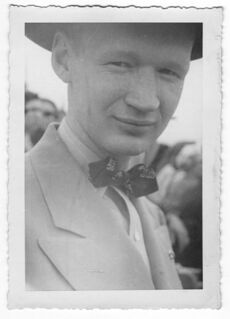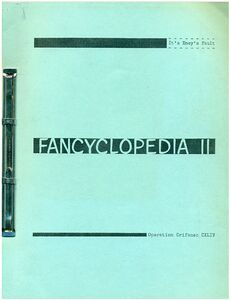Fancyclopedia 3
How to Join[edit]
Don't Panic! Joining Fancyclopedia requires approval by the editors: we won't allow anonymous editing, and wish to avoid spammers, but, otherwise, we are open and inclusive and welcome all SF fans to contribute. Send an email to the editors at fancy3@baskerville.org and we'll help you get started.
If you are not known to the editors, please tell us a bit about yourself or help us by giving us the name of another fan who can identify you to us. Once we know who you are, you will be free to contribute as you like, editing and adding articles. (We don't do this to decide if you're "important enough" to edit, but to make sure that all editors are real and are fans.)
Look yourself up! Look up your friends and the organizations you’ve been part of, the cons you’ve been to. Do you have details that will create a fuller picture? Add them!
About Fancyclopedia[edit]

Science fiction fandom began in the 1930s, when readers of the pulp magazines began to write to each other. While fandom can be a very loose association, its members identify with fandom and with each other, and communicate with other fans.
Fancyclopedia 3 is a collective enterprise of all of fandom. Based on the previous works by Jack Speer (Fancyclopedia 1, 1944) and Dick Eney (Fancyclopedia 2, 1959), plus lexicons by rich brown and Leah Zeldes Smith, it is written by fans who want to contribute.
Fancyclopedia 3 was sporadically worked on by a number of fans, including Dick Eney. In 1983, Bruce Pelz organized a project to publish Fancy 3 in time for L.A.con II in 1984 where Eney was Fan GoH. It didn’t happen. Pelz later passed the project on to Fanac.org and Joe Siclari recruited Jim Caughran, who converted the existing materials to a wiki format. In 2010 he passed the project to Mark Olson who has edited it since (along with a growing number of other people). Jack Weaver and Joe Siclari provided strong support in the site's launch. John Bray ported it to Mediawiki and automated much of the design.
Articles[edit]
Like most encyclopedias, Fancyclopedia contains articles on people, events and organizations. It has a Fanzines category. It contains a glossary of fanspeak, which is referenced by any articles using fannish terms (we started using rich brown's glossary Dr. Gafia's Fan Terms).
- People: Biographies of fans and their achievements and exploits. We do not limit ourselves to BNFs!
- Events: History — the happenings which shaped fandom (or are just interesting).
- Conventions: Big, small and in-between.
- Organizations: Clubs, including city and regional clubs, apas, online lists, etc.
- Fanzines: Focal point fanzines or just people's perzines, including fannish websites.
We want the facts, but we also want good stories so that Fancy 3 gives people a flavor of what makes fandom, fandom.
We seeded Fancy 3 with the articles from Fancyclopedia 1 and Fancyclopedia 2, identified as such, Dr. Gafia's Fan Terms, and many new short articles and stubs. We've also pulled a lot of great information from Rich Lynch's notes towards a history of the ’60s and Leah Zeldes Smith’s lexicons in STET 9 (1999) and Spirits of Things Past 1 (2001). We depend on your contributions; get busy and write something. Go ahead and add credits for anything you contribute.
We're adding material as quickly as we can, but we're particularly in need of articles (even if no more than stubs) on fanzines, fans, clubs, and conventions. But general articles are fine, historical essays, whatever!
Editing is quick and easy and requires no arcane knowledge of HTML.
While your editors do their best to maintain a common style and presentation, Fancyclopedia is edited by its users. With the exception of reprints from earlier editions of Fancyclopedia and other publications, all fans are free to edit topics, as well as contribute articles, suggest authors, and argue with the editors on matters of content, style or presentation. Make your changes — don't wait for permission! (And we're a lot less anal than Wikipedia, so hopefully it will be less frustrating to contribute!) Just bear in mind that this is a collaborative process, so your contributions may well be edited by others.
Articles should be relevant to science fiction fandom as such. We welcome material from closely-related areas, like SF – though since the Science Fiction Encyclopedia does a fine job on SF-the-literature which we don't need to duplicate, we try to focus on what SF means (and meant) to fans.
In general, we are not interested in pop culture or in areas such as comics which split off from fandom and are now essentially separate. So while comics fandom, anime, and the Society for Creative Anachronism (as examples) arose from science fiction fandom, they are now largely independent. Articles on other fandoms should note their relationships with science fiction fandom and provide links to sites concerned with those fandoms.
You can view recent updates and additions at any time by clicking on "Recent changes" in the menu on the left side of most pages.
